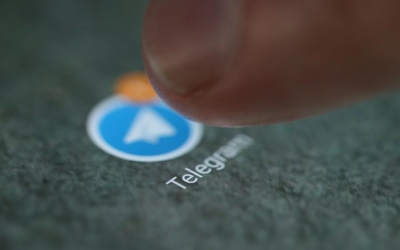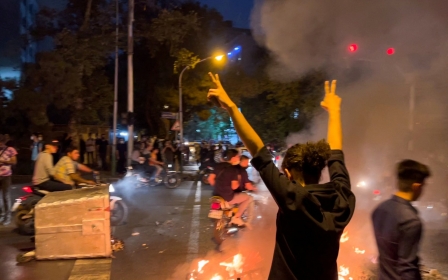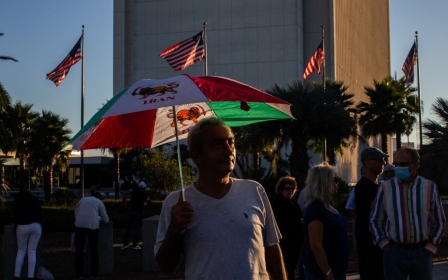Starlink: This is why Elon Musk's Iran plan likely won't have liftoff

From sending people to Mars to sending a small submarine to northern Thailand, Elon Musk has always been a man for the headline-grabbing announcement.
With reports that the Iranian government is limiting internet access in response to the protests that have erupted following the death in police custody of 22-year old Mahsa Amini, the South African billionaire is hoping to ride his rocket to the rescue.
Last Friday, after US Secretary of State Antony Blinken tweeted that the United States had issued a general licence “to advance internet freedom and the free flow of information” to Iranians, the SpaceX CEO said he would activate his firm’s Starlink satellite internet service.
On Sunday, Washington-based Carnegie Endowment fellow Karim Sadjadpour said that he had spoken to Musk, who had told him that: “Starlink is now activated in Iran. It requires the use of terminals in-country, which I suspect the [Iranian] government will not support, but if anyone can get terminals into Iran, they will work.”
With the government in Tehran blocking apps like WhatsApp and Instagram, will the new Iranian revolution be facilitated by a man who wants to colonise Mars and who once tweeted that “Iran’s nuclear weapons facility is apparently called ‘Frodo’. Watch out for Gollum!”?
New MEE newsletter: Jerusalem Dispatch
Sign up to get the latest insights and analysis on Israel-Palestine, alongside Turkey Unpacked and other MEE newsletters
Starlink provides broadband internet access in 40 countries using thousands of satellites orbiting the Earth, rather than fibre-optic cables. In 2020, research found that 43 million people were connected to broadband via satellite. While this number is expected to grow, it still only amounts to around one percent of the planet’s connected population.
Satellite internet is often characterised as being slow and unreliable, but it has also been heralded - including by Musk - as a way for people living under authoritarian regimes to escape censorship and organise opposition.
Starlink's requirements
Simon Angus, director of Monash IP Observatory, which monitors the quality of the internet around the world, told Middle East Eye that anyone wanting to access Starlink in Iran would need three things.
The first of these is a Starlink receiver terminal, which is “what the user will connect their computer or local router to on the ground”.
These receivers, Angus said, can be shipped quickly, as was seen after the Russian invasion of Ukraine, when the Kyiv government reached out to Musk for help and SpaceX duly obliged by shipping terminals into the country via delivery truck. Shortly after the war began, Polish fuels company PKN Orlen was able to send a batch of Starlink satellite dishes into Ukraine.
The difference here, of course, is that - as Musk acknowledged in the comments reported by Sadjadpour - the Iranian government will not support the mass import of terminals that will facilitate opposition organisation.
Starlink access has been heralded for allowing Ukrainian units to communicate with each other in the face of Russian communications interference, but in Kyiv, Musk had a willing partner.

Speaking of their potential import into Iran, Angus said that “such cargo would obviously receive a lot of attention from any border inspectors. The terminals also create an electromagnetic spectrum that can be problematic if the government wishes to crack down on their use”.
A source in a government neighbouring Iran, who wished to remain anonymous, told MEE that the terminals could be dropped into Iran by drone, but that this “would be seen as an act of war by the Iranian government and the Iranian Revolutionary Guard. The situation is explosive. Technology won’t solve it.”
The second thing needed for Starlink to work in Iran, Angus said, is “access for the terminal to the Starlink mesh satellites overhead. This is not difficult for Musk to organise - it would be a re-tasking of existing satellites to provide near enough contact with terminals.”
The third and final piece of hardware needed is a permanent ground station that accesses the terrestrial internet.
“The ground station need not be in the country, it just needs to be ‘visible’ from the satellite mesh network,” Angus said.
“The mesh is so called because it can ‘hop’ from one satellite to another, passing the user’s request between them till reaching a satellite which can access a ground station to complete the request.”
Very Muskian
Once again, this was far easier to navigate in Ukraine, where users relied on stations in Poland, Lithuania and Turkey. Iran is further from any known Starlink ground stations, which raises the entertaining prospect of Musk negotiating with the Taliban government in Afghanistan for the construction and use of a ground station in the Islamic Republic's neighbour.
Recent briefings from SpaceX have suggested that Starlink can now run using laser technology, which would circumvent the need for ground stations. For now, Angus said that Starlink would work “with or without a ground station in Iran”.
But without all three things - terminals, access to the satellite mesh and a working ground station - the claim that Starlink has been "activated" in Iran is essentially meaningless.
The Monash observatory has recorded, by and large, normal levels of connectivity in “Kurdistan, the surrounding provinces, and Tehran”.
'Starlink is never going to be the solution to an entire country’s internet access problems. It just doesn’t scale like that'
- Simon Angus, Monash IP Observatory director
“Now, working with other journalists, there are very likely restrictions on mobile networks… These are most likely carried out by the Iranian government,” Angus said.
Mahsa Alimardani, a senior researcher for the Middle East and North Africa region at Article19, an organisation supporting freedom of expression and information around the world, told MEE the “difficulty I am seeing right now is getting safe, secure VPNs that actually connect”.
“The majority of users are connecting through phones - mostly Android,” she said. “Iran just blocked Google Play store, the biggest source for accessing and downloading safe and secure VPNs. This is a major hurdle that did not exist before.”
Alimardani said that while she was not an Elon Musk fan, she cared more about Iran and so anything that might help was to be welcomed.
Hossein Derakhshan, who was arrested during the Iranian protests of 2009 and imprisoned for six years, told MEE: “I don't have expertise on how feasible and affordable the satellite internet will be. But if it turns out to be both, it'll be fantastic news for everyone in authoritarian states, including Iran.”
However, Angus cautioned that “zooming out, Starlink is never going to be the solution to an entire country’s internet access problems. It just doesn’t scale like that."
"A single terminal is like a single router - you can hang maybe 10 or, at a stretch, 20 devices off a single connection. Ukraine benefited greatly from Starlink not because thousands of citizens got back online, but because Starlink could support strategic connectivity in the field," he said.
“So in summary,” he added, “I would suggest that for the moment, Musk is putting in place a system that may benefit a small number of users who manage to get a Starlink terminal.”
An eye-catching initiative that might benefit a small number of people? Now that would be very Muskian.
Middle East Eye delivers independent and unrivalled coverage and analysis of the Middle East, North Africa and beyond. To learn more about republishing this content and the associated fees, please fill out this form. More about MEE can be found here.




